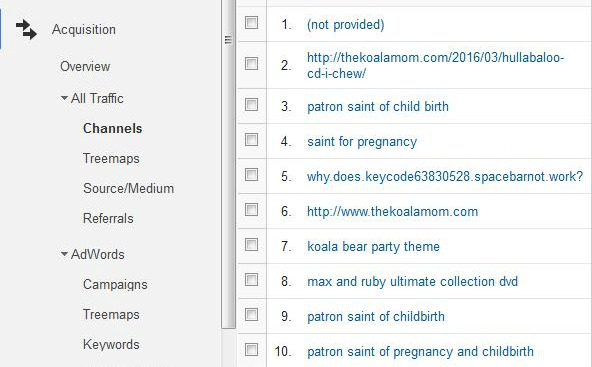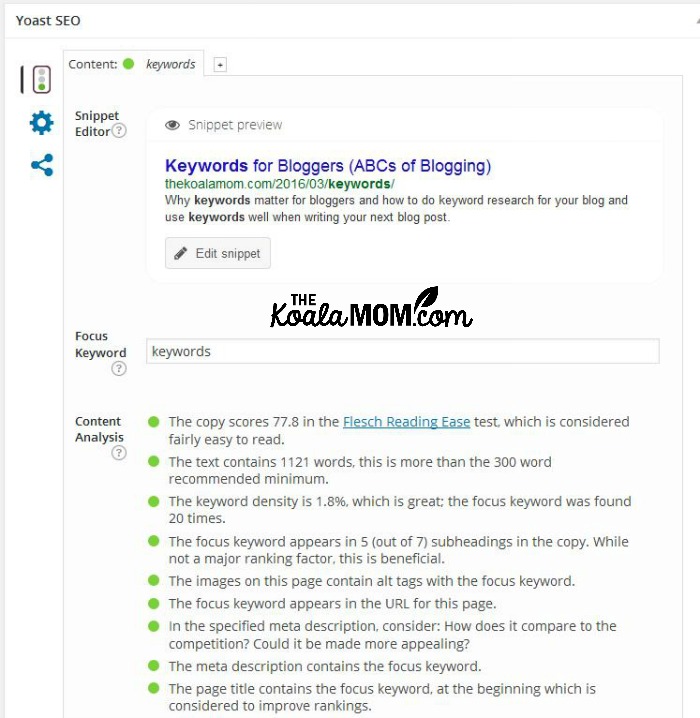I have a love / hate relationship with keywords when I’m blogging. I love the idea that the right keywords make it easier for readers to find my posts via Google. I hate trying to figure out what those keywords might be or how to make sure that my post includes them in exactly the right places. Here’s my tips for choosing keywords for your blog posts.

Why Do Keywords Matter?
Keywords are, of course, mostly for Google, Pinterest, and other search engines. Think of these search engines as the vehicle connecting you with your reader. You need to make it easy for Google to find your post and show it to your readers. Choosing good keywords for your blog posts and using those keywords (or keyword phrase) well in your posts can help your post rank well with Google and be seen by more readers.
This was easier a few years ago, when blogging was just emerging. A good blogger could easily “rank well” in Google’s search engine and get tons of traffic. Now that we are competing with millions of other bloggers in every topic imaginable, it’s harder to rank—but not impossible.
How Do You Choose Keywords for Your BLog Posts?
Think of keywords as the topic or subject of your blog post, boiled down to one word or one short phrase. When I’m writing, I try to think about what I’d type into a search bar in order to find this post. For example, I might look for “tips for homeschooling with a baby” or I might just look up “Instagram.” Try to think like your reader and answer their question or solve their problem.
Of course, this isn’t always easy. Not every post comes with a perfect keyword. Searchers don’t always type coherent sentences into Google to find a post. And you might not want to use a keyword like “Instagram” that has probably already been used a million times. Instead of a broad keyword like that, try to narrow it down. What exactly do you want to know about Instagram? Maybe “how often should I post on Instagram,” or “best posting practices for Instagram,” or “how to use hashtags on Instagram.”
You can check your keywords by going to Google or Pinterest and starting to type. See what is suggested as a way to finish your query. That can give you a clue about what other popular searches are and what you might want to use for your post. For example, I started typing “keyw—” and Google suggested:

Kelly’s Sticky SEO e-course (affiliate link) was a huge help to me in understanding keywords, researching keywords, and choosing keywords for my blog posts to increase traffic to my blog. Before taking her course, I knew that this was an important step in writing a blog post, but as I worked through her course, I realized I hadn’t been doing my keyword research very effectively. Kelly explains search engine optimization and keywords in practical, easy-to-understand terms and gives you specific, actionable steps to take to pick better keywords and improve your SEO.
Using Keyword Tools
You don’t have to figure out keywords on your own. There are many keyword tools available to help you.
If you have a Google Adwords account (it’s free), you can use the Google Keyword Planner to analyze possible keywords and pick the best. The Keyword Planner will give you statistics and data about your suggested keyword. Of course, it is meant to be used by advertisers, who want their posts to rank well in order to drive traffic to their ads, but it can be used just for post planning as well.
If you don’t want to create an Adwords account, there are other free keyword tools you can use. Play with them to see which is the easiest to use. Many will only make limited data available for free (if you want more data, you have to sign up for an account still) so see what’s useful to you. Kelly recommends several paid keyword tools in Sticky SEO, which are worth the investment if you really want to see your traffic improve.
Finding Keywords in Google Analytics
Keyword tools, however, can only give you general data about everyone who uses the internet. What you want is data about YOUR readers and the people who visit YOUR blog. To find that, check out your Google Analytics. (If you haven’t already installed it on your blog, do so now.) There are a variety of analytic apps for blogs, but Google Analytics is the industry standard. And Google Analytics can tell you how visitors are getting to your blog.
For example, when I look up keywords used to find my blog in my GA account, I find out:

Those are the top ten search items people have used to arrive at my blog. Most of those don’t surprise me (my post on “Patron Saints of Pregnancy and Childbirth” has been my top performing post for the last two years) but there are a couple items of interest there: numbers 7 and 8. That tells me that someone reached my blog looking for those things, and maybe I should consider writing a post (or more posts) about those topics.
Your Google Analytics can thus tell you what keywords are popular for your site and be a source of post ideas. For a while, a popular search for my blog was “koala bear pregnancy.” My blog name was the Koala Bear Writer and I’ve blogged a lot about pregnancy. I’ve always thought I should write a post about pregnant koalas (they have it easy, in my mind, as they give birth when their joeys are tiny).
Writing Posts with Good Keywords
Now that you’ve done some keyword research and chosen the best keywords for your blog post, you need to actually write that post. If you’re on WordPress, you can use an awesome plugin called Yoast SEO for help. This plugin sits at the bottom of each post you type and analyzes your post for the focus keyword you’ve chosen. It will also give you tips about adding headings, post length, readability, etc.

The basics of good keywords are that your focus keyword should appear in your post title, in several headings throughout your post, in the first paragraph of your post, and several times within your post text. However, you never want your keyword to sound awkward or spammy. It should flow naturally with your writing. If it doesn’t, maybe you need to reconsider your keyword.
Keywords or No Keywords
Should every post you write get perfect green check marks from Yoast SEO? No. Some posts will naturally and easily include great keywords. As a mom blogger, though, you’ll want to write some posts without looking at Yoast SEO or Google’s Keyword Planner. Write from your heart, for your audience, and don’t worry about the keywords.
For example, my post this week for new moms doesn’t have a good keyword. I didn’t write it for Google and I don’t expect a sleep-deprived postpartum mom to be googling an article like that. I expect that post to do better on social media or among my friends and readers who are already pregnant (or postpartum) and who will share it with their friends who are having babies.
It’s also a good idea not to rely on one source of traffic. The blogosphere is constantly changing. Google updates in the past have decimated blogs and websites that once ranked well. So if you can write a post that ranks well for SEO, great. If it doesn’t, you can use other ways to get it in front of your audience (like Facebook).
Further Reading:
- Beginners Guide to SEO: Keyword Research
- Easy Ways for Bloggers to Use a Keyword to Drive Traffic
- How to Select Good SEO Keyword Phrases
What tips would you share for choosing keywords for your blog posts? Do you consider good keywords when writing posts?


No Responses Yet